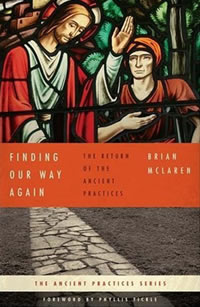Book Notes
 Brian McLaren, Finding Our Way Again; The Return of the Ancient Christian Practices (Nashville: Thomas Nelson, 2008), 216pp.
Brian McLaren, Finding Our Way Again; The Return of the Ancient Christian Practices (Nashville: Thomas Nelson, 2008), 216pp.
Christian renewal movements begin with the claim that the church has lost its way and then move on to suggest how we can revivify the faith. Brian McLaren wants to recast the faith as a "way of life" that moves beyond the tried but tired "systems of belief" found in "militaristic scientific secularism, pushy religious fundamentalism, and mushy amorphous [read "new age"] spirituality." This "fourth way" will look backward in order to move forward. In this introductory volume McLaren sets the table for future books in a series devoted to the seven ancient practices of prayer, fasting, Sabbath, the sacred meal, pilgrimage, the liturgical year, and tithing.
McLaren gravitates toward the idea of the kingdom of God as a movement and away from the church as an institution (37, 51, 52), which is a bit odd given that the ancient practices are distinctly ecclesial. As the founding pastor of the non-denominational Cedar Ridge Community Church in metro-Baltimore (1982–2006), he's well aware of the distinction, although he never addresses the inevitability and even necessity of institutions. Still, who has not resonated with the joke that Jesus promised a kingdom but what we got was the church, or with the conundrum of how we might "bottle the lightening?"
Just as one would never dream of excelling in a sport or playing a musical instrument without hard work, so too the Christian way requires intentional practice(s) for a lifetime. Some of the practices, he explains, are contemplative (reading, Sabbath, or prayer), others are communal (hospitality, singing, or confession), and still others missional (caring for the sick, helping the poor). In the last part of his book McLaren gives general sketches of "a common ancient treasure" of "the threefold way" as found in both the Latin west and the Greek east — namely, the Via Purgativa or Katharsis, Via Illuminativa or Fotosis, and Via Unitiva or Theosis. McLaren shares liberally from his own Christian pilgrimage in a self-effacing manner, and ends each chapter with questions for reflection.


